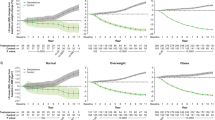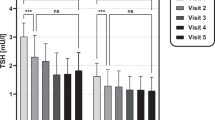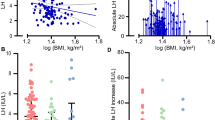Abstract
OBJECTIVE: To elucidate whether the administration of small doses of triidothyronine (T3) can increase concentrations of sex hormone binding globulin (SHBG) in obese women with different types of obesity and to evaluate the potential metabolic benefits of such treatment. DESIGN: Daily administration of 20 μg of T3 during six weeks while maintaining habitual food intake and physical activity. SUBJECTS: Seventy premenopausal obese women (age: 41.2±1.5 y mean±s.e.m., body mass index (BMI): 34.4±0.7). MEASUREMENTS: Plasma concentrations of SHBG, lipids, insulin, thyroid hormones, sex hormones, blood glucose and insulin sensitivity (by euglycemic insulin clamp in 12 patients) at base line after six weeks of treatment. RESULTS: Six weeks treatment with small doses of T3 resulted in a significant increase in plasma SHBG. The increase of SHBG was higher in abdominal obesity and not associated with a significant change in body weight, plasma insulin concentration, insulin/glucose ratio of plasma insulin sensitivity (glucose disposal during insulin clamp). In patients with initially high SHBG the significant increase of insulin removal (as judged from the increase of c-peptide/insulin ratio) was observed. Treatment resulted in a reciprocal increase of T3, decrease of thyroxine (T4), and a more than double increase of T3/T4 ratio. CONCLUSIONS: Administration of small doses of T3 can increase the concentration of SHBG without changing insulin concentrations or sensitivity. As there was a significant decrease (by 36%) of T4 and parallel increase of T3 with a clear increase of T3/T4 ratio it seems possible that rather than lack of thyroid hormones a lower peripheral deiodination of T4 might be a factor contributing to the low SHBG concentration in abdominal obesity. Treatment with small doses of T3 may be considered to ameliorate some of the risk factors associated with abdominal obesity, particularly in some subgroups of obese women with a relative resistance to thyroid hormones possibly dependent on decreased peripheral deiodination of thyroxine.
This is a preview of subscription content, access via your institution
Access options
Subscribe to this journal
Receive 12 print issues and online access
$259.00 per year
only $21.58 per issue
Buy this article
- Purchase on Springer Link
- Instant access to full article PDF
Prices may be subject to local taxes which are calculated during checkout
Similar content being viewed by others
Author information
Authors and Affiliations
Rights and permissions
About this article
Cite this article
Krotkiewski, M., Holm, G. & Shono, N. Small doses of triiodothyronine can change some risk factors associated with abdominal obesity. Int J Obes 21, 922–929 (1997). https://doi.org/10.1038/sj.ijo.0800493
Received:
Revised:
Accepted:
Issue Date:
DOI: https://doi.org/10.1038/sj.ijo.0800493
Keywords
This article is cited by
-
Hormones and breast cancer: can we use them in ways that could reduce the risk?
Oncology Reviews (2008)



